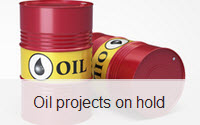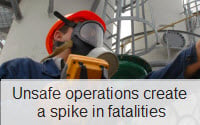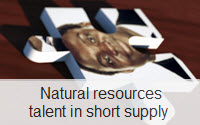
An interview with former Chevron President, Ray Wilcox
As the petrochemical industry adapts to the current business environment, many in the upper echelons of the business are relying on operational excellence (OE) strategies to become more efficient.
 An advocate of an operational excellence focus who has endured years of up and down prices is Ray Wilcox – a 40-year veteran of the petrochemical industry and former president of Chevron North America Exploration and Production, as well as former President and CEO of Chevron Phillips Chemicals.
An advocate of an operational excellence focus who has endured years of up and down prices is Ray Wilcox – a 40-year veteran of the petrochemical industry and former president of Chevron North America Exploration and Production, as well as former President and CEO of Chevron Phillips Chemicals.
SPEAKER KEY:
CM Cay Mims, Director Strategy, Natural Resources, Alexander Proudfoot
RW Ray Wilcox, Former President and CEO, Chevron North America E & P
CM Hello and welcome. My name is Cay Mims, and as Director Strategy, Natural Resources for Alexander Proudfoot, it’s my pleasure to host this interview. As a geologist, I’ve had the distinct pleasure of working for more than two decades in the natural resources sector and in many different operating environments. At Alexander Proudfoot, an execution consulting firm, our primary focus is on operational excellence at the point of execution – on the front lines where the work is performed.
Today we’re interviewing Mr. Ray Wilcox, former President and CEO, Chevron North America E & P. Ray, thank you for agreeing to do this interview. Can you tell our listeners what bridging an execution gap means to you?
RW Thank you, Cay. Perhaps the best way to start answering your question is to tell you what operational excellence, or OE as it is often referred to, means to me.
First and foremost is the issue of safety – not only personnel safety, which most people think of, but also process safety around the many operational processes that we use to run our businesses. Second is the environmental responsibility that we have, both legally and as members of society. It also relates to the reliability and efficiency within our business – specifically people, processes and energy usage. Furthermore, it can be extended to how we interact with the communities where we live and work, and the products that we create.
CM What is an execution gap as it relates to OE?
RW Well, the simple answer is it’s the difference between where you are and where you’d like to be. Or, perhaps even where you have to be, but it’s not in the strategic sense. OE is really about execution, and any gap that exists can be there for a number of reasons. For instance, an evolution of your business, a change strategy or not changing with the times all have the potential to create gaps. They could also be the result of a major event like a merger or an accident.
The gap could be hidden within the organizational structure or caused by overlaps in conflicting processes. Or, maybe the gap is already known but not addressed to the degree that an organization requires in order to improve. We usually call it low-hanging fruit, and it’s funny how the low-hanging fruit always seems to be there.
CM Are there some key focus areas you think are closing the OE gap in the petrochemical industry?
RW Yes, and even though they are actually pretty basic to our industry, they do create a critical framework that is important to any operational excellence question. The first area of focus is the portfolio. What are we actually working on? Are we working on the right things? Can they add value that really impacts our results?
The second area is the organization. Do we even try to do things in a cohesive and effective way across the organization, or is the transfer between divisions or plants like working for a new company? Perhaps the third is standardization of critical processes and best practices – find the best and safest way to do things and keep doing them that way.
Fourth, do we have services like HR and legal, or IT and finance, that are cost-effective and enhance our core business? The final area is capital allocation and expenses. Do we really spend our money on the best projects and with minimum waste?
CM These all seem important. Where do you start?
RW Well, they are important and it’s important to the OE question. I could talk about any of them, but maybe for this segment let’s only talk about standardization.
CM To what level should we standardize processes and practices? How do you ensure that the work being done at the point of execution is being done in a safe, consistent and efficient way?
RW Standardization doesn’t necessarily mean doing everything the same, but it does mean that critical processes and procedures are documented and practiced consistently. It’s no secret why an airplane pilot goes through a checklist before every flight even though he’s probably been flying for more than 20 years. In our business, operational excellence also requires training and repetition – performing critical tasks the same way each time. The standardization of safe and efficient processes will have a major and positive impact on the business. Consider a key activity such as turnarounds – is every plant literally doing their own thing every three to four years? That would be an OE gap.
Now, this effort often requires key people in the organization focused solely on the standardization effort, and with the authority to implement change. In many cases, they become the proactive managers of change and the purveyors of best practices.
Speaking of best practices, that’s always been a favorite topic of mine. If you look at any business organization where certain people love to share their best practices, but are reluctant to adopt other best practices in the organization, it is another sign that an OE gap exists.
CM When you take on a standardization project to close an OE gap, sometimes it is seen as just another initiative or a top-down management directive. How do you avoid that?
RW Winning the hearts and minds of the people in an organization is a tough challenge, especially when change is required. It does take strong leadership to lead the change and win over key members of a team.
Team members need to see a clear business case for what is being asked, and be able to communicate to others the what, the why, and the when of the effort.
The team will need conviction and they will have to put the good of the organization above their individual desires. They will be the change agents and your leaders of the future. And, those that resist may have to be replaced.
It’s also been my experience that most people in an organization really want to know the best and safest way of doing things. They want to be able to see how they add value based on their role in the organization, and they want to be appreciated for what they do. It is no secret that a company with great operational excellence also has great morale.
CM What suggestions do you have for leaders that are tackling OE gaps?
RW I’d say build a solid business case, get the team members on board, and be diligent in the execution of your plan. But, you also have to be honest with yourself and your team about whether the job can be performed internally to get the results you want in a timely fashion. Your people are usually very good at what they do, but do they really have the training and expertise needed to manage a change process? Are they experts in change management so that it becomes lasting change and is woven into the company’s DNA?
Using outside support for tackling any of these focused issues can be extremely helpful, especially if it speeds up the process and supplements the valuable company resources that are needed. The key is getting somebody that really focuses on plan execution and delivery of results. Outside support can help considerably in establishing the precious few metrics that really make a difference and the processes for tracking their results down to the bottom line.
Operations experts are also useful in crafting communications to employees and other key stakeholders – acting as a feedback loop from within your organization during the process.
Sometimes you need an unbiased third party to ask the tough questions – ones that make people nervous and uncomfortable, but are critical to success. Change is not easy or comfortable, especially at the beginning.
CM How do you see the downturn cycle in oil prices affecting operational excellence?
RW It's not just low oil prices. In the petrochemical business, low natural gas prices have been a big economic advantage and spurred major investments in the U.S. I think this activity dramatically enhances the importance of OE. When prices are good and activity is high people have the tendency to be careless. This means not staying true to safe practices because the ability to earn money tends to cover up mistakes very quickly. But, with operational excellence, you've got a good plan to stay on track.
CM What is the best piece of advice you could offer to other executives in the industry?
RW When you look to address gaps in operational excellence, consider where you are and your key focus areas, set your priorities, execute quickly and openly, and in the most efficient and cost-effective manner. All of this might sound easy, but it requires a lot of hard work. If the effort requires some outside help, then get it. Whatever you do, don’t let things drag out. Have a plan and execute it – you’ll have a much better and much safer organization as a result.
You may also like...
 |
 |
 |
